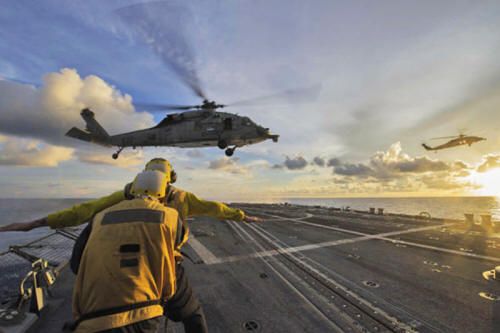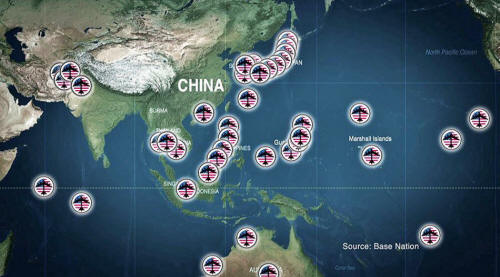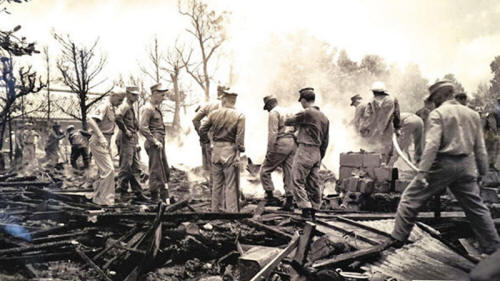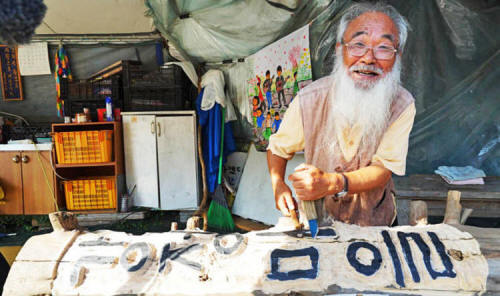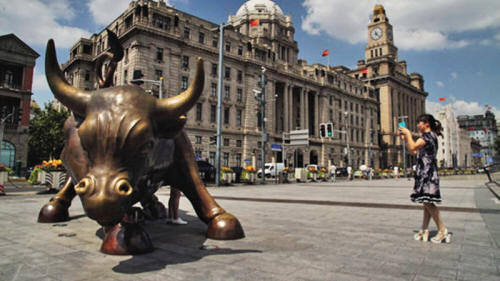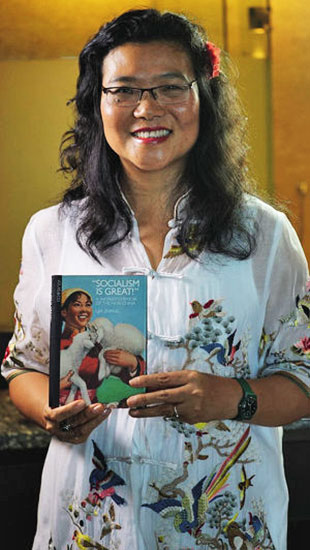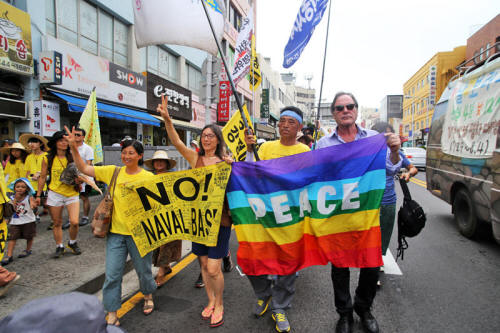|
from NewInternationalistMagazine Website
© US Navy - including nuclear weapons - is under way in Asia and the Pacific with the purpose of confronting China.
John Pilger raises the alarm on an under-reported and dangerous provocation.
It was an almost perfect impression of a human being at ease: legs splayed, back bent, one hand by her side as she sat waiting for a bank to open. At a quarter past eight on the morning of 6 August, 1945, she and her silhouette were burned into the granite.
I stared at the shadow
for an hour or more, unforgettably. When I returned many years
later, it was gone: taken away, 'disappeared', a political
embarrassment.
The greatest build-up of American-led military forces since the Second World War is well under way.
They are on the western
borders of Russia, and in Asia and the Pacific, confronting China.
From Australia north
through the Pacific to Japan, Korea and across Eurasia to
Afghanistan and India, the bases form, says one US strategist, 'the
perfect noose'.
Commissioned by the US Army, the authors evoke the Cold War when RAND made notorious the catch cry of its chief strategist, Herman Kahn - 'thinking the unthinkable'.
Kahn's book,
On
Thermonuclear War, elaborated a plan for a 'winnable' nuclear war
against the Soviet Union.
The current Secretary of Defense, Ashley Carter, a verbose provocateur, says US policy is to confront those,
Today, more than 400 American military bases encircle China with missiles, bombers, warships and nuclear weapons. Charles Gatward: The Coming War on China,
Darmouth Films
'Punish' China
The US, he writes,
This war would begin with a,
The incalculable risk is that,
In 2015, the Pentagon released its Law of War Manual.
In China, a strategist told me,
China's military and arsenal are small compared to America's.
However,
'I don't want it to be a fair fight. It it's a knife fight, I want to bring a gun'.
Professor Ted Postol was scientific adviser to the head of US naval operations.
An authority on nuclear weapons, he told me,
I said,
Andrew Krepinevich is a former Pentagon war planner and the influential author of war games against China.
He wants to 'punish' China for extending its defences to the South China Sea. He advocates seeding the ocean with sea mines, sending in US special forces and enforcing a naval blockade.
He told me,
In 2015, in high secrecy, the US staged its biggest single military exercise since the Cold War.
This was
Talisman Sabre;
an armada of ships and long-range bombers rehearsed an 'Air-Sea
Battle Concept for China' - ASB - blocking sea lanes in the Straits
of Malacca and cutting off China's access to oil, gas and other raw
materials from the Middle East and Africa.
Last July, the UN Permanent Court of Arbitration ruled against China's claim of sovereignty over these islands.
Although the action was
brought by the Philippines, it was presented by leading American and
British lawyers and can be traced to then US Secretary of State
Hillary Clinton.
She declared China's
claim on the Spratly Islands - which lie more than 7,500 miles
(12,000 kilometers) from the United States - a threat to US
'national security' and to 'freedom of navigation'.
This established five
rotating US bases and restored a hated colonial provision that
American forces and contractors were immune from Philippine law.
The BBC persuaded
frightened Filipino pilots to fly a single-engine Cessna over the
disputed islands 'to see how the Chinese would react'. None of the
news reports questioned why the Chinese were building airstrips off
their own coastline, or why American military forces were massing on
China's doorstep.
Never was imperial domination described as pithily.
These 'partners' include South Korea, an American colony in all but name and the launch pad for the Pentagon's Terminal High Altitude Air Defense system, known as THAAD, ostensibly aimed at North Korea.
As Professor Postol
points out, it targets China.
The imagery was front-page news.
Australia is America's most obsequious 'partner'; its political elite, military, intelligence agencies and the dominant Murdoch media are fully integrated into what is known as the 'alliance'.
Closing the Sydney
Harbour Bridge for the motorcade of a visiting American government
'dignitary' is not uncommon. The war criminal
Dick Cheney was afforded this
honor.
The few political dissenters in Canberra risk McCarthyite smears in the Murdoch press.
One of the most important US bases is Pine Gap near Alice Springs.
Founded by the CIA, it
spies on China and all of Asia, and is a vital contributor to
Washington's murderous war by drone in the Middle East.
In other words, a
decision that could mean war with a nuclear power should not be
taken by an elected leader or a parliament but by an admiral or a
general.
The ascendancy of the Pentagon in Washington - which Daniel Ellsberg has called a silent coup - is reflected in the record $5 trillion the United States has spent on aggressive wars since 9/11, according to a study by Brown University.
The million dead in Iraq and the flight of 12 million refugees from at least four countries are the consequence.
Under Obama, nuclear warhead spending has risen higher than under any president since the end of the Cold War.
A mini nuclear weapon is planned.
Known as the B61 Model 12, it will mean, says General James Cartwright, former vice-chair of the Joint Chiefs of Staff, that,
Today, the principal target is China, with whom Okinawans have close cultural and trade ties.
into Miyamori School, Okinawa,
killing a number of children.
People cannot sleep,
teachers cannot teach. Wherever they go in their own country, they
are fenced in and told to keep out.
Barely acknowledged in
the wider world, the resistance in Okinawa is a vivid expression of
how ordinary people can peacefully take on a military giant, and
threaten to win.
Fumiko and hundreds of others took refuge in beautiful Henoko Bay, which she is now fighting to save. The US wants to destroy the bay in order to extend runways for its bombers.
As we gathered peacefully outside the US base, Camp Schwab, giant Sea Stallion helicopters hovered over us for no reason other than to intimidate.
an Okinawa World War Two survivor, is now fighting to save a bay from US bombers. With her is Eiko Ginoza.
Bruno
Sorrentino and John Pilger
On this island of world
peace has been built one of the most provocative military bases in
the world, less than 400 miles (650 kilometers) from Shanghai. The
fishing village of Gangjeong is dominated by a South Korean naval
base purpose-built for US aircraft carriers, nuclear submarines and
destroyers equipped with the Aegis missile system, aimed at China.
Every day, often twice a day, villagers, Catholic priests and supporters from all over the world stage a religious mass that blocks the gates of the base.
In a country where
political demonstrations are often banned, unlike powerful
religions, the tactic has produced an inspiring spectacle.
but the astonishing vision of Eurasia from China
is barely understood in the
West
Father Mun Jeong-hyeon, leads a daily protest against the building of a naval base that the US will use to target China.
Bruno
Sorrentino and John Pilger
When I was last in China, the loudest noise I remember was the tinkling of bicycle bells; Mao Zedong had recently died, and the cities seemed dark places, in which foreboding and expectation competed.
Within a few years,
Deng Xiaoping, the 'man who changed China', was the 'paramount
leader'. Nothing prepared me for the astonishing changes today.
She grew up during the chaotic and brutal Cultural Revolution and has lived in the US and Europe.
China today: a tourist snaps the bull of capitalism in front of Shanghai's Bund hotel, bedecked with communist flags.
Bruno Sorrentino and John Pilger
Today, it stands in the
heart of a very capitalist shopping district; you walk out of this
communist shrine with your Little Red Book and your plastic bust of
Mao into the embrace of Starbucks, Apple, Cartier, Prada.
Five years before his great revolution in 1949, he sent this secret message to Washington.
Mao offered to meet Franklin Roosevelt in the White House, and his successor Harry Truman, and his successor Dwight Eisenhower.
He was rebuffed, or willfully ignored.
The opportunity that might have changed contemporary history, prevented wars in Asia and saved countless lives was lost because the truth of these overtures was denied in 1950s Washington,
Eric Li, a Shanghai venture capitalist and social scientist, told me,
Beijing journalist and outspoken maverick, Lijia Zhang.
The 'New Silk Road' is a ribbon of trade, ports, pipelines and high-speed trains all the way to Europe. China, the world's leader in rail technology, is negotiating with 28 countries for routes on which trains will reach up to 400 kilometers an hour.
This opening to the world
has the approval of much of humanity and, along the way, is uniting
China and Russia; and they are doing it entirely without 'us' in the
West.
In the past five years, the US has shipped deadly weapons to 96 countries, most of them poor.
Dividing societies in order to control them is US policy, as the tragedies in Iraq and Syria demonstrate.
Bruno
Sorrentino and John Pilger
This modern cult of superiority is Americanism, the world's dominant predator.
Accompanied by a
brainwashing that presents it as enlightenment on the march, the
conceit insinuates our lives.
The new enemies were a 'resurgent' Russia and an 'increasingly aggressive' China.
Only heroic
America can 'save' us...
It is as if the 'American
Century' - proclaimed in 1941 by the American imperialist Henry
Luce, owner of Time magazine - has ended without notice
and no-one has had the courage to tell the emperor to take his guns
and go home...
|


